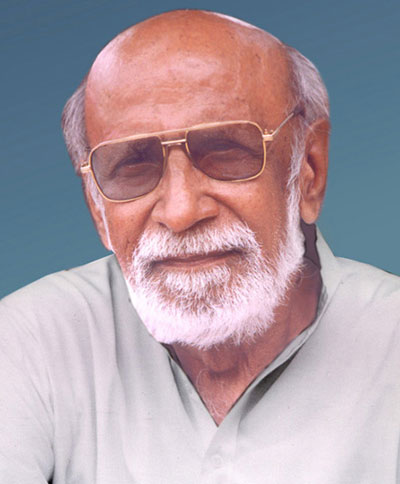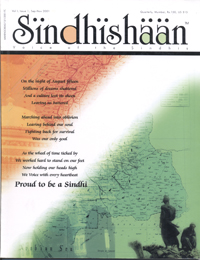GOBIND MALHI (1921 – 2001) – Illunination of Love
Adapted from an article by Kirat Babani

After a long and an agonizing illness, he passed away on 10th February 2001, at his Kandivli house, leaving behind one married daughter Shobha and a widowed sister Umri. His bereavement is an irrevocable loss to the Sindhi commune all over the world. His loss will be grieved over for a long time. Although nature does not leave any emptiness in any field, but his substitution seems unattainable. Gobind Malhi was undeniably such a resourceful, remarkable and a noteworthy star!
Gobind Malhi – Versatile, affectionate and unique would be only some words to describe him as a person. He was born in the year 1921, in Nawabshah District in a small village Tharushah, in a Hindu Zamindar family. The position of the society in those days was highly volatile with ample communal limitations and taboos. The conventional and conservative attitude towards human relations, led to gruesome environment. But fortunately Gobind Malhi even at that little age had the fortitude, which was boisterous to the extent that in his early days he dismayed the prescribed customs and norms, which were customary to the faction of society in that part of the region.

The most important aspect to note is Gobind Malhi’s love for music and nature right from his childhood days. He used to allured to wild surroundings in the village gardens and fields and sit all the way through the nights in the musical programmes, by village singers or the folk – bards. The fondness and love for music led him to leave home in the midnights to attend these musical programmes.
On the personal front, there were a lot of factors that influenced his formative years, which left an impact on his mind. Malhi, when only sixteen months lost his mother. This misfortune struck so early in his babyhood for him to even realise a loss as grave as this. Another was a societal blight where Malhi was practically forced to get into matrimony, especially when he was still following his studies at the Karachi College. The customary and the traditional atmosphere and conservative family taboo had taken its toll.
However Malhi was also privileged since he was remunerated for such fatalities. He was sent to Karachi, the biggest and the most modern city of Sindh for further edification. This was an extraordinary chance for Malhi to come in contact with populace of sophistication and cream of the crop, which as a upshot broadened his ideas and values through communication with this new caliber of society.
Also Gobind Malhi was lucky in an added way. Malhi’s father was an ardent lover of books. He had put together a substantial personal collection of fine books and publications and Malhi, already having keen interest in music and writing, was stimulated and drew immense knowledge from these manuscripts. He grew to be an avid person who read books with great passion. He acquired sense and ability at an early age. He started writing poems while only 14 years of age. He dedicated these poems to his lady loves. No less than two such relationships were revealed, which inspired his tender emotions. Since both these sagas remained unfulfilled, it lingered Malhi’s mind with sweet and bitter memories and left him pining.
Gobind Malhi was also involved in National Movement for independence of India and he enthusiastically involved himself in the actions of the Indian National Congress.
Malhi’s participation in the National Movement was opposed by his father who was a traditional and law abiding person by nature. The brought about differences between the son and the father. This led to a big crack in their relationship but in the later years they squared off.
In Karachi, the National Movement had taken a radical turn under the headship of Hashu Kewalramani and Sobho Gianchandani, who had taken the charge of the movement. Both the leaders hugely influenced Malhi. He along with other students plunged into the 1942 ‘Quit India Movement.’ Gobind was detained and imprisoned for three months for violating colonial laws.
Gobind Malhi grew to be well known and attained a significant status in the inception of literary gatherings in Karachi. These literary gatherings attracted a great deal of significance that even the finest writers of those days – Sheikh Ayaz, Narian Shyam, Sheikh Raz, Late Sugun Ahuja, Lachhman Rajpal, Ram Amarlal Panwani and many more complimented him for his role in the literary arena. Gobind Malhi was attributed with becoming the creator and editor of the magazine ‘Nia Duniya’, which became the strength for encouragement of Progressive thought in Sindhi.
Partition resulted in slow down on the growth of Sindhi literature, but luckily this slowdown ended in a little while. Gobind Malhi who was one of the first incomers amongst the Progressive writers in Mumbai, took care that the significance of literature did not fade away. Malhi’s literary persona was fascinating to the writers of new age band. He was a guide and a philosopher to everyone.
It can be said without any fear of contradiction that the involvement of Malhi in the literary field has been enormous. He has written over two dozen novels, three dozen short plays and over thirty-five short stories in a variety of journals and magazines. Further, his involvement and effort to enrich Sindhi language through translation of good literature from other rich languages, such as English, Hindi and Urdu has also been remarkable. Malhi’s writings have also been translated into English and few other Indian languages and have been renowned and highly praised. He received quite a few esteemed awards. He received the Central Sahitya Academy’s award from the Maharashtra Rajya Sindhi Sahitya Academy in the year 1990 and the Maharashtra Gaurav Puraskar form the Government of Maharashtra in the year 1992.
Malhi also enterprised in many fields and was successful in drama, film and in music too. Malhi experienced many great events in his life, which not only changed his course of life but he also helped Sindhi culture in a big way. No historian will ever forget the historical role of Malhi. He was a writer of the novel times, who put tremendous efforts to keep Sindhi alive in the heart of the Sindhis. He was the true aficionado of mother Sindh, which thumped in his every nerve.
Also Malhi’s organizational capacity was astounding, Malhi’s played an important role in bringing Sindhi writers on a common platform.
Malhi’s multifaceted persona said it all!
It was simply amazing to see him summon so much energy to endure such extensive travels and other odds for over three decades. And all those years he incessantly wrote, with equal passion and keenness. His pen never stopped. It is really a mystery; as to from where did he draw such vigour. It was aptly said, ‘He was a surging soul in a frail body.’
Shri Gobind Malhi, Shri A J Uttam and Shri Kirat Babani came to be known as the Trimurtis of Sindhi literature – post partition for their exemplary work in upholding and uplifting the fading culture through their writings. Sindhishaan salutes them! |


